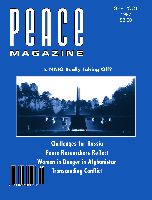
Peace Magazine Sep-Oct 1997, page 5. Some rights reserved.
Search for other articles by various here
Holly Ackerman's claim that international tribunals have established that the Brothers to the Rescue planes were unarmed and in international waters when shot down by the Cuban government is inaccurate and misleading. This is what actually occurred:
To prove its claim [that the Cubans shot down an unarmed Cuban-American plane over international waters] the [U.S.] State Department submitted evi- dence to the International Civil Aviation Organization (ICAO), [including] a tape recording allegedly made at the time of the event. The Cubans forwarded a tape of the same events, but with serious discrepanacies from the U.S. tape. In the American version, the Cuban Air Force pilots who shot down the Brothers are heard telling Havana about the position of two ships off the coast. The Cuban tape, however, has none of these comments about the ships. Either the Brothers were inside Cuban airspace if the Cubans are to be believed, or they were over international waters if the U.S. version is correct. After investigating the tapes, the ICAO refused to condemn the Cuban government but did issue a general resolution which noted that shooting down civilian aircraft is unwarranted, whether sovereign airspace is violated or not. The Cubans asked ICAO to reopen the investigation. They [unlike the U.S.] provided the ICAO group with the actual tape and machine on which it was recorded for forensic examination. Without voice print analysis, the American claim is not actually proved.
Moreover, in late 1996 the U.S. introduced a new biological epidemic onto the island meant to destroy the country's food crops. Cuban authorities identified the plant-destroying insects as Thrips palmi. The first signs of a "Thrips plague" appeared in Matanzas province after a U.S. crop-dusting plane was seen spraying unknown substances during a flight over the region. The U.S. government acknowledged that a crop-dusting plane had flown over Cuba but denied charges that it had sprayed Thrips palmi.
Robert S. Rodvik, Gibsons, B.C.
The apologists of the Cuban regime have several standard themes, one of which is changing the subject. I think Holly Ackerman responded well to them, with one major exception. I think she weakened her political position by [seeming] soft on Clinton and lacking principled anti-imperialism. I disagree with her views on compensation for confiscated U.S. property. From a moral point of view, Cuba owes nothing to the U.S. companies any more than slaveowners should have been compensated for emancipation. Still, she was right on the facts as far as I know and her critics do not impress me at all. Amnesty, Human Rights Watch, and PEN have issued hundreds of reports about Cuba over the years. Physical brutality in prisons was more common in the earlier period, but there are still many real issues for both prisoners and people outside of prison.
Samuel Farber, New York, NY
Two clarifications for my article,"Nine Points for Abolishing Nuclear Weapons" (July/August). First, the article ends by noting that withdrawal from all three agreements - nuclear weapons ban, biological and chemical conventions (BWC/ CWC) - would have to be "prohibited" (or else states such as the United States might not sign the nuclear ban, because other states could at any time drop out and develop such weapons which the U.S. had already renounced). "Nonwithdrawal" could be accomplished by a simple nuclear ban treaty provision such as this: "Withdrawal from the [nuclear ban] treaty is not permitted, and treaty parties [i.e. all states] promise not to withdraw from the Biological Weapons Convention and Chemical Weapons Convention."
Also, since no one knows exactly when a unanimous worldwide nuclear weapons ban will be enacted, the duration of the nuclear ban weapons elimination period should be set according to a treaty-specified scale based on possible quantities of remaining U.S.-Russian nuclear weapons when the nuclear ban enters into force. This would allow the weapons elimination period to automatically be of a duration (perhaps two to ten years) appropriate to the actual remaining number of nuclear weapons when the nuclear ban treaty enters into force.
Frederick N. Mattis, Annapolis, Maryland

Peace Magazine Sep-Oct 1997, page 5. Some rights reserved.
Search for other articles by various here